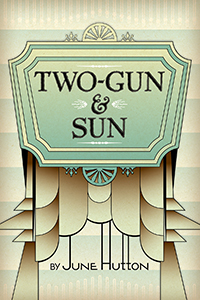Reviews
Fiction Review by Carol Matthews
June Hutton, Two-Gun & Sun (Half Moon Bay: Caitlin, 2015). Paperbound, 236 pp., $22.95.
 Set in a West Coast mining town in the 1920s, Two Gun & Sun, contains drama and danger, comedy and tragedy, love and loss, politics, and even a Puccini opera as a leitmotiffor the plot. Loosely based on the historical figures of Morris Cohen and Dr. Sun Yat-sen, the novel is describes as "part historical novel, part steampunk opera and part otherworldly Western."
Set in a West Coast mining town in the 1920s, Two Gun & Sun, contains drama and danger, comedy and tragedy, love and loss, politics, and even a Puccini opera as a leitmotiffor the plot. Loosely based on the historical figures of Morris Cohen and Dr. Sun Yat-sen, the novel is describes as "part historical novel, part steampunk opera and part otherworldly Western."
For Lila Sinclair, life at home in the Kootenays offered little opportunity for adventure, let alone love; Lila's first brush with romance, a kiss from a handsome, pacifist Doukhobor boy, was soon thwarted by her father's prejudice and her lover's strict religion. When her brothers return from the war and Lila is no longer needed in the fruit business, she decides to find work as a teacher but doesn't last a year. The narrative takes us along Lila's pilgrimage as she leaves her family home in the orchards of Nelson and boards a midnight ship to a small mining town on the Pacific coast, where she plans to resurrect the newspaper her dead uncle bequeathed to her.
At first glance, the town of Black Mountain doesn't present much that would attract someone seeking a wider world: "The stink of it was up my nose, a mix of outhouse and crushed barnacles and rotten eggs." The town is damp, dark, dirty, and cloistered, and the people wear miner's helmets with lights strapped on because, as the boat's navigator explains, "Every hour that calls itself day is dusk in Black Mountain." Soon after her arrival Lila is blinded by black flies, hits a post, and is knocked unconscious. In the doctor's office she meets her future business partner, Morris Cohen, who is lying beside her with leeches covering his eyes. The cast of characters is colourful. Known as Two-Gun and referring to himself as "Maurice de Montréal," Cohen, is a charming and duplicitous character with a checkered past and a questionable future. Vincent Cruz, a handsome Chinese man with a braided queue of black hair, helps her with the paper but is not as responsive to her as she wishes. Dr. Sun Yat–sen, the mysterious leader, is always awaited, but seen only from a distance. There are the flamboyant Women of the Saloon, the self-appointed Sherriff, Silver Evans, and his "filthy scum of a deputy" who gets satisfaction from piercing a prostitute's nipple with a fish hook, and the stylish dressmaker who drapes Lila in midnight blue silk to prepare her for a night at the opera. On the other side of the mountain is Lousetown, where the Chinese live and keep to themselves. In the thick of the dank mist they've constructed (early versions of) solar dishes to run the newspaper and grow tomatoes, asparagus, and roses. In contrast to Black Mountain, Lousetown appears to be a functioning community, but the residents suffer at the hands of those who employ and control them. As Dr. Sun Yat-sen notes in his famous speech: "The British treat nations as the silkworm farmer treats his worms; as long as they produce silk, he cares for them; when they stop, he sets them on fire, he feeds them to the fish."
There's always news for Lila to print: the striking Women of the Saloon bearing placards emblazoned with red lips and dollar signs; the deformed fish appearing in the creek; the possibility of diamonds being found at the mine. There are also challenges: threats from the mine owner, incidents with the vile deputy, a chase by enormous, putrid-smelling wild pigs causing an accident that requires her to stitch up her own leg with a needle and thread. Fortunately she has her ever-ready flask of whisky for cleansing and courage. The travelling musicians of the La fanciulla del West (The Girl of the West) add texture and sentiments that resonate for Lila. Particularly poignant is Ch'ella mi Creda, the aria in which the handsome outlaw asks others to tell the woman he loves that he escaped and is on the road to redemption.
This is a swashbuckling tale, full of mysterious twists and turns, a page-turner, but sometimes the mysteries become so confusing the reader has to turn back again to figure out just what's happening. Hutton's prose is spare, muscular, but the narrative is dense with overlapping themes and events that are difficult to follow, particularly with the dialogue lacking quotation marks. Lila's story has many characteristics of a bildungsroman: a heroine falling out with her family, leaving home, searching for purpose, overcoming challenges and failures, and, finally, experiencing an epiphany. After struggles with her horrendous surroundings, the newspaper, her double-dealing partner and disappearing lover, she realizes she has a choice: "…a choice very different from deciding to teach, to prove I could provide for myself and to thumb my nose at another's beliefs, or to take on a business that was someone else's creation, and inherit all its problems, or especially to take on a dubious deal to save such a business. No, this time it was a choice that was mine alone to take."
Unlike the classic bildungsroman, however, Lila doesn't choose to return to conventional society and accept its rules and values. Instead she literally plunges into new territory, diving into the ocean, climbing a rope ladder to a ship bound for China, uncaring what her soaked chemise will reveal: "Well, let the passengers and crew see me, then, let the whole blasted world see me…I had lived long enough in small towns on the edge of nowhere to know what it was to want more." Surely this ending predicts a sequel. Lila has said more than once that she wants to be seen, and the reader is left wishing to see her again.
—Carol Matthews









